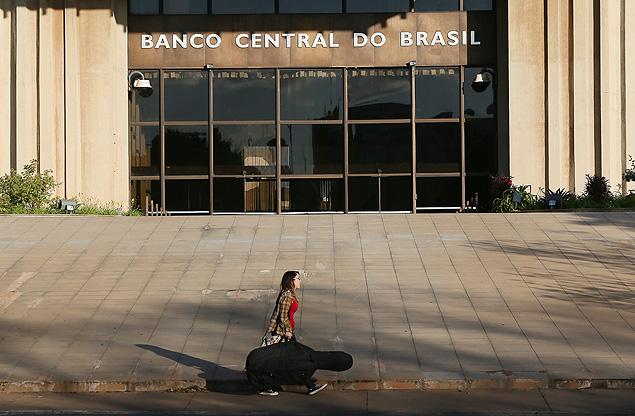Latest Photo Galleries
Brazilian Markets
17h33 Bovespa |
-0,33% | 125.148 |
16h43 Gold |
0,00% | 117 |
17h00 Dollar |
-0,77% | 5,1290 |
16h30 Euro |
+0,49% | 2,65250 |
ADVERTISING
Brazil's Central Bank Sees Risk of Inflation and Interest Rates Go Up to 11.25%
10/30/2014 - 09h20
Advertising
EDUARDO CUCOLO
VALDO CRUZ
FROM BRASÍLIA
At the first meeting after the reelection of Brazilian President Dilma Rousseff, Brazil's Central Bank surprised everyone after it was released that interest rates have risen from 11% to 11,25% on Wednesday, October 29th.
A rising dollar, in addition to the worsening state of governmental accounting meant that five out of eight members of the Committee for Monetary Politics (Copom, in the Brazilian acronym) decided to back the increase of what is called the Selic interest rate, which had been at 11% since April.
According to research carried out by Folha, if the dollar continues to be pressured the trend is for the Central Bank to raise the rate by 0.25%, in contrast to market expectations.
Throughout her reelection campaign, Rousseff sought to associate her adversary, Aécio Neves, of the Brazilian Social Democratic Party (PSDB), to a kind of political economy based on high interest rates in order to dodge inflation.
In one of her speeches, the reelected President said that the PSDB party "has always sown hardship to reap interest rates".
The rate of 11.25% is the highest since it reached 11.5%, dating back to November 2011.
Amongst the five directors who voted in favor of the rise, are the president of the Central Bank, Alexandre Tombini and the director of Political Economy, Carlos Hamilton. Both have recently said that, if necessary, Copom could raise the interest rates further.
Three days after the reelection, the monetary tightening is an attempt to win back credibility in the fight against inflation in Ms Rousseff's government.
In this way the Economics team is to announce a special package in the coming week that features measures for the reduction of expenditure and an increase in revenue, aimed to revert the negative results in governmental accounting, which currently in the red.
Copom has said in its press release that "the intensification of price adjustments in relation to the economy has made the balance of risks less favorable to inflation". Tariffs and exchange rates were the "relative prices" that were mentioned by the Central Bank as the responsible factors for inflation.
"Taking this into consideration, the Committee thought it was timely to adjust the monetary conditions in such a way as to uphold the prevalence of a positive landscape for inflation in 2015 and 2016."
The exchange rate is one of the main factors that can take inflation past its target, of 6.5% for this year. Until September inflation had reached 6.75% in the preceding 12 months.
In its most recent prediction, the Central Bank estimated inflation of 6.3% in 2014, with the dollar at R$2.25. Today the currency reached R$2.45. The 10% rise is enough to surpass the estimated target for inflation.
Translated by CRISTIANE COSTA LIMA
Read the article in the original language
| Sergio Lima/Folhapress | ||
 |
||
| Brazil's Central Bank surprised everyone after it was released that interest rates have risen from 11% to 11,25% |



